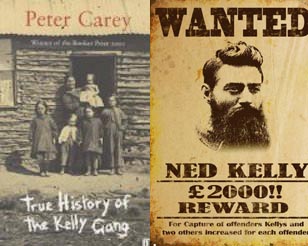
- He was an outlaw in Australia
- He was hanged for his crimes
- In his final shootout he wore a helmet made from iron with slits for his eyes
Carey’s novel takes us way beyond those headline facts and into the mind of the man whose first encounter with the law happened when he was just thirteen years old and he was charged with the assault and robbery of a Chinese pig and fowl trader. By the time Ned Kelly was 25 he had progressed to cattle thieving, bank robberies and murder. How this child of a dirt-poor Irish immigrant family became one of the most wanted men in Australia and the stuff of legends is the premise of True History of the Kelly Gang.
Based partly on historical documents including the Jerilderie Letter written by Kelly to a fellow outlaw, the novel begins with a 12-year-old boy forced to grow up quickly when his father dies. As head of the family, Ned is fiercely protective of his mother and siblings, putting his heart and soul into building fences around their farm in Victoria and clearing the land to protect crops and livestock. Manoeuvred by his mother to become an apprentice to the infamous bushranger Harry Power, Ned is drawn increasingly into a life of crime. He fights with his mother’s suitors and the police, and when he shoots a treacherous police officer in self-defense, Ned is forced to flee into the wild bush country. With his younger brother and two friends he commits audacious crimes, all the while gaining widespread support from poor oppressed farmers and remaining one step ahead of the forces of law and order.
True History of the Kelly Gang is an imaginative reconstruction of Ned Kelly’s life story in his own words. Dedicated to the baby daughter he has never seen, Kelly wants to set the record straight. He promises her at the beginning that his history “will contain no single lie may I burn in Hell if I speak false” and the word ‘True’ in the title further seeks to persuade us that this is an definitive and authoritative account of his life and of the injustices suffered by the Irish in Australia.
He repeatedly represents himself as a person who was pushed into the life of an outlaw by forces beyond his control. “What choice did I have?” he asks, when he kills the constable who heads the local police station. At other times he reflects on how he has been betrayed by the dishonesty of others. He operates to a code of ethics that will not let him see his brother imprisoned for an act that he Ned committed, and that drives him to rob banks to raise money for the release of his mother from what he considers an unlawful imprisonment. All of this is in strong contrast to the lack of princples he witness among the police, judges and fellow settlers.
All of this is rendered in a style that is striking. Carey’s narrative has a directness and immediacy of tone that makes it hard to resist Kelly’s portrait of himself as a man who had the stuffing knocked out of him as a child. Coming out of a stint of hard labour in prison he reflects:
I were 17 yr old when I came out of prison 6ft 2in. broad of shoulder my hands as hard as the hammers we had swung inside the walls of Beecworth Goal. I had a mighty beard and was a child no more although in truth I do not know what childhood or youth I ever had. What remained if any were finally taken away inside that goal boiled off me like fat and marrow is rendered within the tallow pot.
The raggedness of this style of writing with its lack of punctuation and free flow from one thought to another took me a little time to get used to but once any initial reservations were overcome, I got swept along. Kelly may have lacked a formal education but he knows how to tell a story and to describe the environment in which he lives and hides. Here are a few examples I picked out:
“Many is the night I have sat by the roaring river the rain never ending them logs so green bubbling and spitting blazing in a rage no rain can staunch.”
“The clouds was light but queerly yellow on their edges as they moved across the ageless constellations.”
“Curtains of bark hung from the trunks like shredded skin”
These moments together with flashes of humour and reflections on the Irish experience were welcome contrasts to the torrent of detail about cattle thieving, double crossing, run-ins with the law and shoot-outs. Ned Kelly seems to have perfect recall of every stage of his life and every conversation and to want to tell us about every single detail. I got a bit tired of this three quarters of the way through. Though I did enjoy it, less would certainly have more with this book.
Footnotes
About this book: True History of the Kelly Gang by Peter Carey was first published in 2000 by the University of Queensland Press. It won the Booker Prize in 2001. My copy is a paperback published by Mackays of Chatham.
About the author: Born in Australia in 1943, Peter Carey is the author of six previous novels and a collection of stories. He won the Booker Prize for Oscar and Lucinda; his other honors include the Commonwealth Prize and the Miles Franklin Award. He became only the second author to win the Booker Prize twice.
Why I read this book: it’s one of the few remaining books on my Booker Prize project. I included it in my 20booksofsummer project for 2017.

